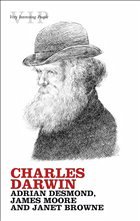Definitive, concise, and very interesting...
From William Shakespeare to Winston Churchill, the Very Interesting People series provides authoritative bite-sized biographies of Britain's most fascinating historical figures - people whose influence and importance have stood the test of time.
Each book in the series is based upon the biographical entry from the world-famous Oxford Dictionary of National Biography.
Table of Contents:
Preface
1. Upbringing and education
2. The Beagle voyage, 1831-1836
3. Theorizing in London, 1836-1842
4. Parish naturalist, 1842-1856
5. The Origin of Species
6. The rise of Darwinism
7. Botany and belief, 1861-1882
8. Darwin's legacy
Sources
Index
Review:
From Publishers Weekly
The centerpiece of this vivid portrait of Darwin, the first volume of a two-volume biography, is an account of his five-year expedition on the Beagle (1831-36), which transformed a seasick, Cambridge-educated science apprentice into a keen observer of nature and amateur geologist. Drawing on a wealth of new material from family archives, Brown masterfully recreates the personal, cultural and intellectual matrix out of which Darwin's evolutionary theory took shape. We glimpse many facets of Darwin: the failed medical student; the laid-back undergraduate; the impassioned abolitionist; the explorer roping cattle with gauchos on the Argentine pampas; the chronically ill country squire, the patriarchal husband and reluctant atheist whose devout Anglican wife, Emma, disapproved of his theory of human origins. Browne, an English historian of science and associate editor of Darwin's Correspondence, captures the spirit of a quietly revolutionary scientist whose ingrained Victorian prejudices were at odds with his radical ideas. Photos.
Copyright 1995 Reed Business Information, Inc.
From Library Journal
After editing eight volumes of Darwin's correspondence (available from Cambridge University Press), Browne has many new insights into this complex figure. Her new book, the first volume in a planned two-volume biography, describes Darwin's childhood, education, his voyage on the Beagle, family life, and early researches to 1856, as he begins serious work on his "species book." As in Adrian Desmond and James Moore's Darwin (LJ 5/15/92), Darwin is seen more as a product of his society than in some previous biographies. Desmond and Moore delve more deeply into Darwin's university days than does Browne, while she provides a more detailed account of his Beagle voyage. While calling any Darwin biography "definitive" may be a bit optimistic, this work is certainly an important contribution to the literature on Darwin. Highly recommended for both academic and general collections.
Bruce Neville, Univ. of Texas at El Paso Lib.
From William Shakespeare to Winston Churchill, the Very Interesting People series provides authoritative bite-sized biographies of Britain's most fascinating historical figures - people whose influence and importance have stood the test of time.
Each book in the series is based upon the biographical entry from the world-famous Oxford Dictionary of National Biography.
Table of Contents:
Preface
1. Upbringing and education
2. The Beagle voyage, 1831-1836
3. Theorizing in London, 1836-1842
4. Parish naturalist, 1842-1856
5. The Origin of Species
6. The rise of Darwinism
7. Botany and belief, 1861-1882
8. Darwin's legacy
Sources
Index
Review:
From Publishers Weekly
The centerpiece of this vivid portrait of Darwin, the first volume of a two-volume biography, is an account of his five-year expedition on the Beagle (1831-36), which transformed a seasick, Cambridge-educated science apprentice into a keen observer of nature and amateur geologist. Drawing on a wealth of new material from family archives, Brown masterfully recreates the personal, cultural and intellectual matrix out of which Darwin's evolutionary theory took shape. We glimpse many facets of Darwin: the failed medical student; the laid-back undergraduate; the impassioned abolitionist; the explorer roping cattle with gauchos on the Argentine pampas; the chronically ill country squire, the patriarchal husband and reluctant atheist whose devout Anglican wife, Emma, disapproved of his theory of human origins. Browne, an English historian of science and associate editor of Darwin's Correspondence, captures the spirit of a quietly revolutionary scientist whose ingrained Victorian prejudices were at odds with his radical ideas. Photos.
Copyright 1995 Reed Business Information, Inc.
From Library Journal
After editing eight volumes of Darwin's correspondence (available from Cambridge University Press), Browne has many new insights into this complex figure. Her new book, the first volume in a planned two-volume biography, describes Darwin's childhood, education, his voyage on the Beagle, family life, and early researches to 1856, as he begins serious work on his "species book." As in Adrian Desmond and James Moore's Darwin (LJ 5/15/92), Darwin is seen more as a product of his society than in some previous biographies. Desmond and Moore delve more deeply into Darwin's university days than does Browne, while she provides a more detailed account of his Beagle voyage. While calling any Darwin biography "definitive" may be a bit optimistic, this work is certainly an important contribution to the literature on Darwin. Highly recommended for both academic and general collections.
Bruce Neville, Univ. of Texas at El Paso Lib.

